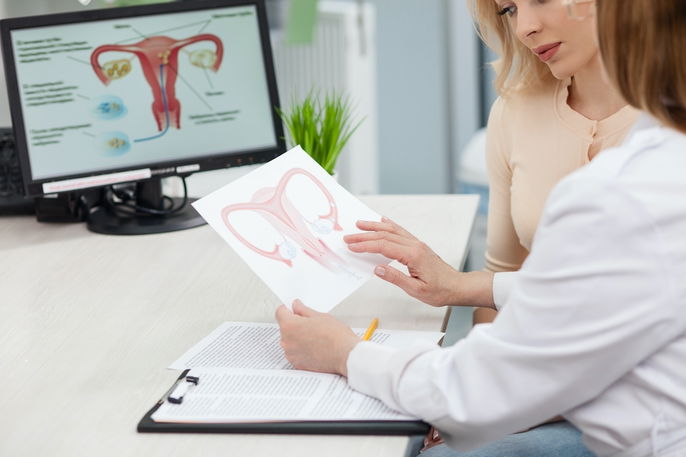Endometritis is the inflammation of the tissue that lines the uterus, which can cause symptoms such as lower abdominal pain, yellow discharge or vaginal bleeding during sex. In some cases, it can affect fertility and lead to difficulty getting pregnant.
Endometritis is commonly caused by sexually transmitted infections (STIs), such as gonorrhea and trichomoniasis. However, it can also be caused by vaginal irritation or inadequate genital hygiene. It is more common in younger women and in women with multiple sexual partners.
If you suspect you may have endometritis, it is important to consult a gynecologist to confirm a diagnosis, identify the underlying cause and start the most appropriate treatment. The doctor will prescribe medications like antibiotics and antifungals to resolve any contributing infections, although surgery may be needed in more severe cases.

A diagnosis is confirmed by a gynecologist through a pap smear or through examination called colposcopy. Both of these assessments allows the doctor observe internal tissue and collect a specimen for analysis.. Treatment is usually done with pills or ointments, which may be antibiotics or anti-inflammatory drugs, for example.
Common symptoms
The main symptoms of endometritis include:
- Yellow, brown or gray discharge with a foul odor
- Vaginal bleeding during or after sex
- Vaginal bleeding outside of a period
- Lower abdominal pain
- Pain when urinating
- Discomfort during sex
- Fever
Pain tends to worsen when palpating the abdomen and, sometimes, can be felt below the ribs on the right side. Pain can also become more intense with movement or breathing.
Also recommended: Uterine Pain: 7 Causes, Treatment & Tests tuasaude.com/en/uterine-painSymptoms of endometritis can sometimes be mild or even go unnoticed in some women. In addition, it is possible for symptoms to present very similarly to those of other conditions like ovarian inflammation or fibroids.
Endometritis and pregnancy
Endometritis can affect fertility can make it difficult to get pregnant, especially when inflammation is also seen in the fallopian tubes. Although this condition during pregnancy does not interfere with fetal development, it can lead to complications such as miscarriage if not treated properly.
Main causes
The main causes of endometritis are:
- Sexually transmitted infections (STIs), such as gonorrhea and chlamydia
- Bacterial vaginosis, due to the overgrowth of bacteria that are normally found in the vagin
- Poor genital hygiene, which can lead to the multiplication of microorganisms that can cause disease
- Use of inappropriate products for genital hygiene, especially the use of irritating soaps and perfumed products, as these can alter vaginal pH and promote the growth of microorganisms
- Trauma or injury, from introducing of objects, such as condoms, tampons, or surgical instruments into the vagina
- Allergies, due to the condom or diaphragm materials or chemical products like spermicides.
Endometritis is more common in women under 25 years of age and in women with multiple partners. It is also more common in women who engage in unprotected sex, or have a history of STIs or uterine inflammation.
Endometritis can sometimes be confused with other condition, such as endometriosis or adenomyosis, which is why it is important to consult a doctor to confirm a diagnosis and begin the most appropriate treatment.
Also recommended: Endometriosis Symptoms (In the Bladder, Bowels or Ovaries) tuasaude.com/en/endometriosis-symptomsTreatment options
The treatment for endometritis depends on the underlying cause of the problem. When the inflammation is due to the presence of foreign microorganisms, it may can treated with a course of antibiotic, antiviral or antifungal medication such as nystatin, miconazole, clindamycin or metronidazole. These medications should be used as prescribed. In some cases, sexual partners also need to be treated, to prevent reinfection of the same microorganisms that caused the inflammation.
The gynecologist may also advise cauterization of the cervix to help heal any lesions. If the inflammation in the uterus is caused by an allergy to materials that come into contact with the woman's internal region, such as a condom or a diaphragm, the use of these products should be discontinued and, if necessary, anti-inflammatory drugs can be taken to alleviate pain and help the uterus to recover.
If uterine inflammation is not treated, inflammation can spread to other internal regions, such as the endometrium, fallopian tubes, and ovaries. In these cases, you may need to be treated in a hospital setting with IV medication to better-contain the inflammation.
Home remedies
You should avoid any sexual contact while completing treatment. To complement your prescribed treatment of endometritis, you should also increase your fluid intake (to at least 2 L or half a gallon of water per day). A healthy diet rich in omega 3 (which is present in salmon and sardines), fruits, vegetables and greens will help to speed-up the healing of any inflammation.
Can endometritis become cancer?
If the inflammation in the uterus is caused by certain types of the HPV virus, and it is not properly treated, it is possible for the inflammation to develop into cervical cancer over time. Therefore, whenever there are signs and symptoms that indicate an inflammation, it is important to seek a gynecologist’s help to identify the correct cause and start treatment as soon as possible.






























